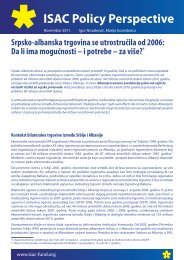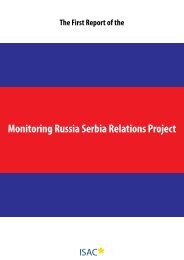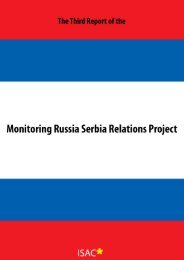the process of security sector reform - ISAC Fund
the process of security sector reform - ISAC Fund
the process of security sector reform - ISAC Fund
Create successful ePaper yourself
Turn your PDF publications into a flip-book with our unique Google optimized e-Paper software.
George Katsirdakis SECURITY SECTOR REFORM FROM A NATO VIEWPOINT<br />
George Katsirdakis SECURITY SECTOR REFORM FROM A NATO VIEWPOINT<br />
unnecessarily resorting to <strong>the</strong> need for secrecy over <strong>the</strong> activities <strong>of</strong> <strong>the</strong> actors<br />
<strong>of</strong> <strong>the</strong> <strong>security</strong> <strong>sector</strong>. Although it is understandable that because <strong>of</strong> <strong>the</strong> nature <strong>of</strong><br />
<strong>the</strong> activities <strong>of</strong> some <strong>of</strong> <strong>the</strong> actors <strong>of</strong> <strong>the</strong> <strong>security</strong> <strong>sector</strong> an element <strong>of</strong> secrecy is<br />
necessary, for some <strong>of</strong> <strong>the</strong>ir activities and structures, this should not be extended<br />
to almost <strong>the</strong> totality <strong>of</strong> <strong>the</strong>ir functions. It should be clearly understood by all<br />
<strong>the</strong> state-related actors that <strong>the</strong> civil society actors have <strong>the</strong> right to be fully<br />
informed and <strong>the</strong> responsibility to scrutinise both <strong>the</strong> activities <strong>of</strong> <strong>the</strong> <strong>security</strong><br />
<strong>sector</strong> and its use <strong>of</strong> available resources.<br />
POTENTIAL NON-CONVENTIONAL ACTORS (SEE)<br />
In <strong>the</strong> relevant literature on <strong>the</strong> <strong>security</strong> <strong>sector</strong> <strong>the</strong>re is sometimes reference to<br />
some o<strong>the</strong>r non-conventional actors <strong>of</strong> <strong>the</strong> <strong>security</strong> <strong>sector</strong>, particularly relevant<br />
to countries <strong>of</strong> South East Europe during <strong>the</strong> recent years <strong>of</strong> instability in some <strong>of</strong><br />
<strong>the</strong> countries <strong>of</strong> <strong>the</strong> region. These actors exist only under conditions <strong>of</strong> instability<br />
and have no reason <strong>of</strong> existence in stable and well governed democratic states.<br />
Such actors are “Liberation Armies”, guerrilla armies, various forms <strong>of</strong> militias<br />
including political party militias.<br />
WHY SSR?<br />
After describing in general terms what is SSR and <strong>the</strong> various actors <strong>of</strong> <strong>the</strong><br />
<strong>security</strong> <strong>sector</strong>, <strong>the</strong> obvious question that arises is “why should a state embark<br />
on SSR?”<br />
The first point that could be made in this respect is that in a democratic society<br />
<strong>the</strong>re is no place for an un<strong>reform</strong>ed <strong>security</strong> <strong>sector</strong>. Bluntly put, an un<strong>reform</strong>ed<br />
<strong>security</strong> <strong>sector</strong> may be dangerous for <strong>the</strong> stability <strong>of</strong> <strong>the</strong> state and for its democratic<br />
institutions. The recent history examples <strong>of</strong> <strong>the</strong> validity <strong>of</strong> this statement are,<br />
unfortunately, so many that no self-respecting democratic state can afford to<br />
disregard <strong>the</strong>m.<br />
Ano<strong>the</strong>r practical reason necessitating SSR is <strong>the</strong> cost <strong>of</strong> maintaining and running<br />
<strong>the</strong> various actors <strong>of</strong> <strong>the</strong> broader <strong>security</strong> <strong>sector</strong>. The armed forces, <strong>the</strong> police, <strong>the</strong><br />
gendarmerie, <strong>the</strong> internal <strong>security</strong> forces, <strong>the</strong> border guards, <strong>the</strong> coast guards etc,<br />
are as an aggregate by far <strong>the</strong> biggest spenders <strong>of</strong> <strong>the</strong> state budget and, where<br />
this case may apply, <strong>of</strong> <strong>the</strong> state investments budget. Especially in <strong>the</strong> case <strong>of</strong><br />
countries in transition, where resources tend to be even more scarce than in o<strong>the</strong>r<br />
countries, <strong>the</strong>re is an inescapable necessity <strong>of</strong> reducing <strong>the</strong> budget expenditures,<br />
in some cases dramatically, to balance expenditures with <strong>the</strong> receipts <strong>of</strong> <strong>the</strong> state<br />
budget. However, although <strong>the</strong> principle <strong>of</strong> reducing expenditures to <strong>the</strong> <strong>security</strong><br />
<strong>sector</strong> to economise on resources may look like a sound approach, governments<br />
should be extremely careful, before deciding to cut funds. They must first have<br />
developed a realistic and affordable strategy <strong>of</strong> <strong>reform</strong> <strong>of</strong> <strong>the</strong> <strong>security</strong> <strong>sector</strong> to<br />
ensure that <strong>the</strong> organisations <strong>of</strong> <strong>the</strong> <strong>sector</strong>, despite rationalisation, will remain<br />
effective and fully functional and capable to carry out <strong>the</strong>ir missions. If this is not<br />
done with <strong>the</strong> utmost care and as a top priority issue <strong>the</strong> result will be a negative<br />
impact on <strong>the</strong> <strong>security</strong> <strong>sector</strong> organisations, serious decline <strong>of</strong> morale, inability to<br />
function properly and in this respect <strong>the</strong> state would actually have to face a much<br />
bigger problem than <strong>the</strong> one it would try to resolve.<br />
One more point that could be made is that an un<strong>reform</strong>ed <strong>security</strong> <strong>sector</strong> tends<br />
to be fragmented, highly compartmentalised, uncoordinated and thus totally<br />
inefficient and <strong>of</strong> little use to <strong>the</strong> state. This is particularly true if <strong>the</strong> state has<br />
to deal with highly complex and multi-dimensional <strong>security</strong> challenges such<br />
as <strong>the</strong> <strong>security</strong> challenges <strong>of</strong> international terrorism and <strong>of</strong> asymmetric threats<br />
especially in <strong>the</strong> cases that weapons <strong>of</strong> mass destruction (WMD) are involved.<br />
In <strong>the</strong> post-September 11 <strong>security</strong> environment <strong>the</strong>re simply is no space for defence<br />
and <strong>security</strong> services that do not fully cooperate and coordinate with each o<strong>the</strong>r<br />
and that do not try to work in <strong>the</strong> most effective way possible to be successful in<br />
<strong>the</strong>ir missions. What is required under <strong>the</strong> new <strong>security</strong> threats is very thorough<br />
and effective inter-departmental coordination and cooperation, effective use <strong>of</strong><br />
resources, effective sharing <strong>of</strong> intelligence and <strong>of</strong> o<strong>the</strong>r relevant information, task<br />
force organisational structures, proper technological equipment and re-definition<br />
<strong>of</strong> <strong>the</strong> missions, structures, organisation, resourcing, functioning and oversight <strong>of</strong><br />
<strong>the</strong> <strong>security</strong> <strong>sector</strong> actors if a state wants to have a chance in effectively dealing<br />
with <strong>the</strong> new <strong>security</strong> challenges. All <strong>the</strong>se cannot be achieved unless <strong>the</strong> entire<br />
<strong>security</strong> <strong>sector</strong> is <strong>reform</strong>ed, redesigned and re-oriented from <strong>the</strong> “business as<br />
usual” approach to <strong>the</strong> “homeland defence” approach.<br />
In <strong>the</strong> case <strong>of</strong> countries transitioning from a totalitarian regime to a democratic<br />
state <strong>the</strong> need for <strong>reform</strong> <strong>of</strong> <strong>the</strong> <strong>security</strong> <strong>sector</strong> is even more imperative because <strong>of</strong><br />
56 57

















